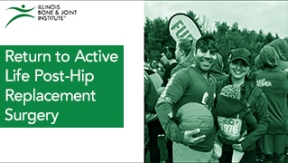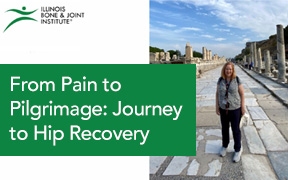This article is part of the Ultimate Guide to Hip Pain Relief.
Hip osteoarthritis can be painful and even completely debilitating in some cases. After years of motion and abuse, all of that wear and tear can cause damage to a hip, potentially leading to osteoarthritis. This degenerative joint disease is a result of the cartilage in the hip being damaged and worn away over the years. After the cartilage has disappeared, the bones are allowed to rub against each other, resulting in inflammation and pain.
Risks Associated With Osteoarthritis In The Hip
Due to genetics almost anyone can be affected by hip osteoarthritis, though there are some things that can increase the likelihood of developing this disease. Since this disease is caused by damaged bone over a long period of time, people over 50 are typically the most affected. If the hips are forced to bear more weight than normal more damage is done to the cartilage which means that people who are overweight have an increased potential for developing hip osteoarthritis. A previous injury, like a broken bone or dislocation, is often seen in cases of osteoarthritis in the hip. Joint deformation, like hip dysplasia, can cause the cartilage to be worn abnormally and quicker than usual leading to potential for earlier onsets of arthritis.
How Hip Osteoarthritis Feels
Many osteoarthritis patients have good days and bad days. The pain is not always a constant bother, but many patients report experiencing the below symptoms:
- A grinding or crunching sound and feeling in the hip
- Increased pain after use
- Joint stiffness first thing in the morning
- Inflammation, swelling, or pain in the hip
- An ache in the upper or outer thigh
- Weakening of the muscles around the hip
- A new or increased limp when walking
- A range of motion that is restricted
- Normal daily activities, like walking, are painful
How Physicians Can Help Relieve Arthritis Pain
Preventing hip osteoarthritis through weight loss and exercise to strengthen hip muscles should always be the goal. If the damage has already been done there are a number of options available to orthopedic doctors when treating hip arthritis. The primary goal of any treatment plan should always be to maintain or increase the patient’s quality of life. The potential treatments for osteoarthritis may include:
- Rest to reduce inflammation and allow time for healing.
- Exercise to increase blood flow, release pain relieving endorphins, and cause weight loss
- Non-steroidal anti-inflammatory drugs
- Using a device to assist walking, like a cane or walker
- Physical therapy to find pain free ways to perform normally painful activities
- As a last result surgery, like hip replacement or resurfacing, may be suggested
Superb Medical Care Is The Best Way To Get Relief
To ensure the highest level of care it is important to get treated by doctors trained in treating osteoarthritis called rheumatologists. Rheumatologists are orthopedic physicians that have received additional training, education, and experience in helping patients with conditions and diseases like osteoarthritis. The physicians at the Illinois Bone and Joint Institute are some of the best rheumatologists in the Chicagoland area. If you are experiencing arthritis like pain in your hip, or any other joint, Schedule online today with one of the rheumatology physicians at IBJI.
*This content is for information only and is not intended to replace the diagnosis, treatment, or medical advice from your treating healthcare professionals. The content does not provide medical advice, does not constitute the practice of medicine or other healthcare professional services, and does not create a doctor-patient relationship. You should not rely on this information as a substitute, nor does it replace professional medical advice, diagnosis, or treatment. If you have concerns or questions, seek the advice of your healthcare professionals. If you think you may have a medical emergency, call your doctor or 911 immediately. Do not rely on electronic communications or communicate through this website for immediate, urgent medical needs. This website is not designed to facilitate medical emergencies. The use of the information is at the reader’s own risk. The links are provided for information and convenience only. We cannot accept responsibility for the sites linked or the information found here. A link does not imply an endorsement of a site.





